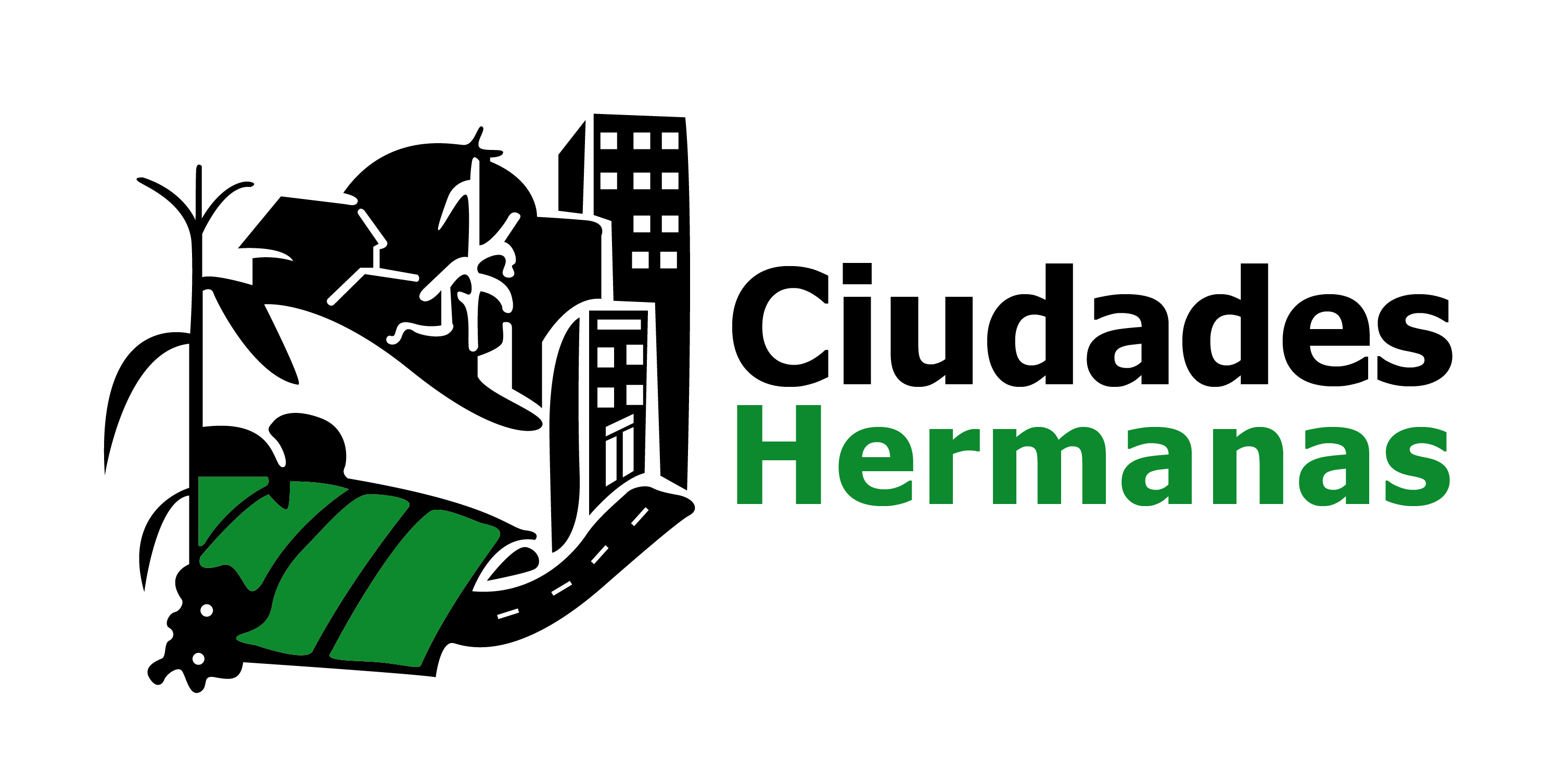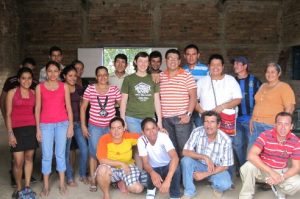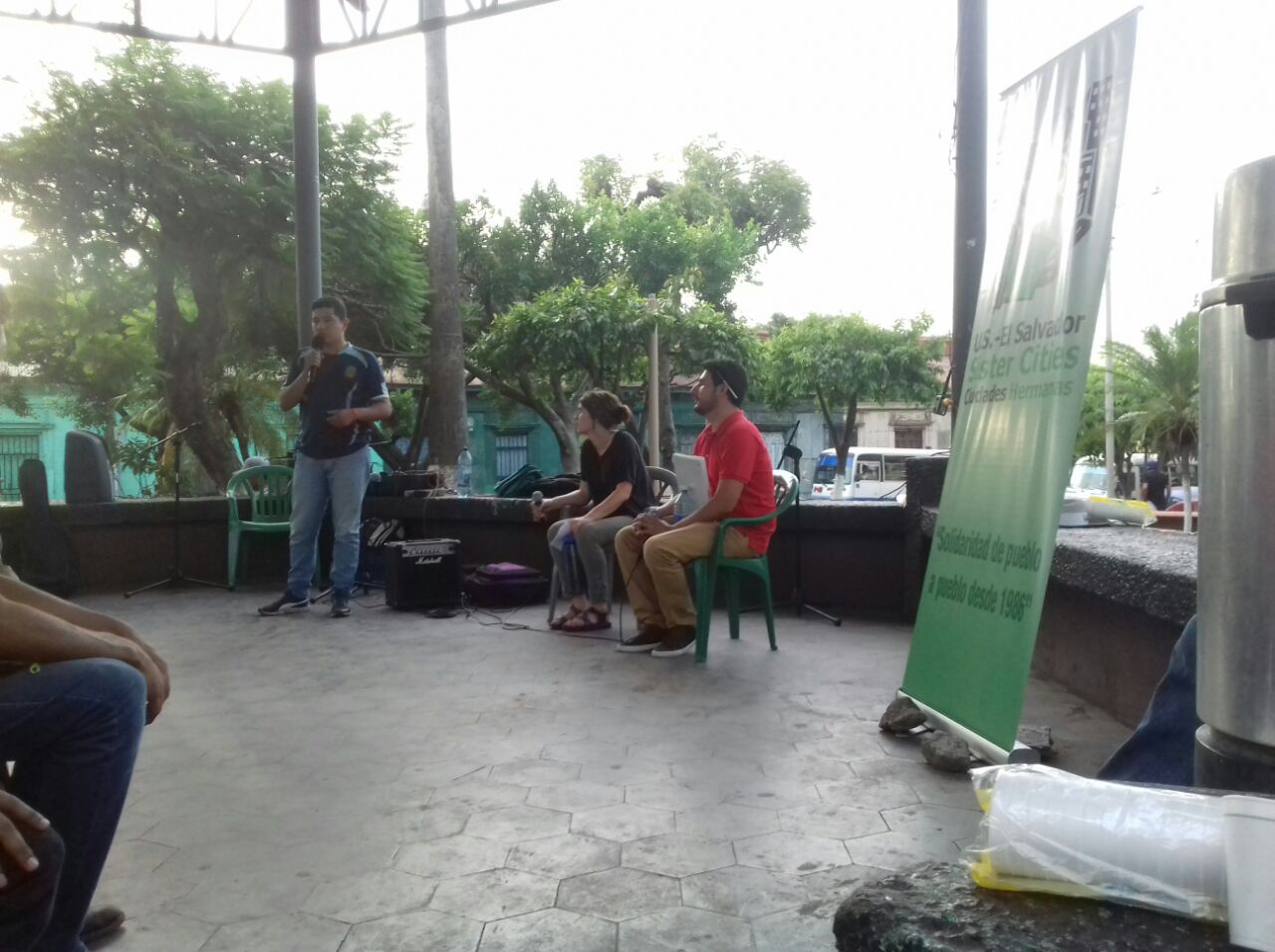Online Resources, Sister Cities
Sister Cities Featured in Social Policy Magazine
Learning From 25 Years of Solidarity, Struggle, & Tortilla-Making in El Salvador
Written by Alexandra Early & Jan Morrill for Social Policy Magazine.
Full article at www.socialpolicy.org.
This summer, Sister Cities celebrates twenty-five years of cross-border solidarity with the campesinos of El Salvador. Among other things, this milestone means that North Americans visitors have been coming into rural communities and trying their hand at making tortillas, a key element of any Salvadoran meal.Inevitably our well-meaning gringo tortillas turn out square, burnt, too thick, or too small — much to the amusement of our hosts.
However, many of the most informative and moving discussions with Salvadoran families occur at the kitchen table and over the tortilla grill. In that setting, our obvious culinary shortcomings are quickly overlooked, amid face-to-face conversations about the past ordeals of civil war, the condition of local crops and roads, the tragedy of forced emigration, and what North American and Salvadoran communities can do together through an on-going cultural exchange that benefits both partners. The good-natured sharing of burnt tortillas is just a small part of our solidarity relationship. What flows from this and many other personal encounters is a stronger mutual commitment to link struggles for social and economic justice in our two very different but deeply intertwined countries.
On the U.S. side, the El Salvador Sister Cities network now includes sixteen Midwest and East Coast towns and cities. In each one, a committee of local volunteers has formed a partnership with an organized rural community belonging to the Association for the Development of El Salvador (or CRIPDES, in its Spanish acronym). CRIPDES was originally known as the Christian Committee for the Displaced of El Salvador. In the 1980s, it focused on assisting Salvadorans refugees who fled to Nicaragua, Honduras, or refugee camps in San Salvador during the nation’s twelve-year civil war, which took more than 70,000 lives in a country that has only seven million citizens today. (The civil war and its less violent but economically harsh aftermath are the main reasons that an estimated 1.5 million Salvadorans now live and work in the U.S., instead of their homeland.)
With help from CRIPDES and the Catholic and Lutheran churches, some refugees were able to return to their country and create new communities even while the fighting continued. To secure greater support and protection for much-endangered civilians, CRIPDES reached out to political allies abroad. One by one, the first Sister Cities pairings were arranged – between Cambridge, Massachusetts, and San Jose Las Flores in the department of Chalatenango, between Madison, Wisconsin, and Arcatao, also in Chalatenango, and between Baltimore and El Barillo, a village in Cuscatlan. The U.S.- based groups financially supported their sister communities as the campesinos in them built new homes, churches, and community centers. They also lobbied Congress to cut off Pentagon funding of the Salvadoran military and denounced violence against repopulated communities.
Sister Cities activists also traveled to their adopted communities, under civil war conditions, to build personal ties of friendship and to document human rights abuses. As their Salvadoran partners say today, “nunca nos dejaron solos.” Just by their very presence, North American delegations and volunteers sent both the U.S and Salvadoran governments a strong political message that these valiant rural communities were not alone.
A Changing Post-War Role
Since negotiation of the 1992 peace accords, the work of CRIPDES and Sister Cities has grown and changed. CRIPDES now works with 350 rural communities mostly in the central part of the country. The conservative governments in power between 1992 and 2009 did little to pave roads or build schools in the countryside so campesinos were forced to organize these projects on their own. Each CRIPDES community has a junta directiva, or community council. These seven to nine person elected bodies make decisions about everything from community celebrations to development projects and local codes of conduct. CRIPDES helps secure international funding for community development projects, supports the community councils overseeing them, and works with local women, youth, and environmental committees. Through elected regional teams of community organizers CRIPDES trains local people to be leaders, critical thinkers, participants in the political system, and agents of change in their communities. The result of all this work is a level of political consciousness and local organization that we could certainly use, at the grassroots, in more parts of North America!
During two decades of post-war right-wing rule, CRIPDES has resisted privatization of social services, defended human rights, and raised the demands of the rural poor at the local, national, and international level. In the United States, Sister Cities has supported these struggles through political lobbying, public education campaigns, and non-stop fund-raising. In 2007, when fourteen CRIPDES leaders were arrested on their way to a water privatization forum — and then charged with terrorist acts — Sister Cities helped mobilize an international campaign that eventually forced the Salvadoran government to release the “Suchitoto 14.”
In the game-changing presidential election of 2009, Sister Cities provided international observers before and after the vote that helped increase transparency and real democracy. For years, Salvadoran national elections have been tainted by fraud and intimidation, plus the intervention of U.S. diplomats opposed to the left even after the Frente Farabundo Marti para la Liberacion Nacional (FMLN) disarmed and transformed into a peaceful, legal political party. Before the 2009 vote, Sister Cities and other activist groups met with members of Congress and U.S. Embassy officials in San Salvador, covered the competition between the FMLN and the incumbent ARENA party, and placed foreign observers at voting centers in seven regions of the country. In response to this political pressure and public scrutiny, the then Democrat-controlled House Committee on Foreign Affairs, the U.S. Embassy in San Salvador, and Barack Obama’s State Department all issued unprecedented statements of election neutrality, which contrasted with past implied threats of dire consequences if the left prevailed. Overcoming great odds, Salvadorans elected a president backed by the left, Mauricio Funes, for the first time in their national history.
Click here to read the full article on the Social Policy Magazine Website.



